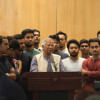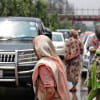Development hollow sans democracy
The country’s development cannot be sustained for long without establishing meaningful democracy, eminent citizens said at a roundtable yesterday.
Pointing out the growing income disparity and corruption stemming from lack of accountability and transparency in different sectors, they said the government’s present narrative of development remained questionable because only a section of people benefited from it.
The observations came at a roundtable on “Democracy and Sustainable Development” organised by Dhaka Forum, a think tank, at the Jatiya Press Club in the capital yesterday.
Presenting an “issue paper” on the topic, former Bangladesh Bank governor Dr Salehuddin Ahmed said shrinking space for democracy led to uneven distribution of capital which was evident in the country at present.
The debate over whether development or democracy comes first is depriving the countrymen, he said, adding, development without democracy was meaningless.
“It’s not possible to walk much on one foot,” he added.
It is true that Bangladesh is making economic development, however, there was growing inequality, said Dr Ahmed.
Lower and lower-middle income groups are being deprived of benefits of the development in various ways, he said.
In terms of accountability, he said as present public representatives didn’t show accountability towards the countrymen, this caused bureaucrats to lack accountability over their responsibilities.
Moreover, bankers have no accountability as well, Dr Ahmed added.
Bangladesh’s visible development turned out to be an “illusion”, said economist Prof Anu Muhammad.
“We are seeing GDP [gross domestic product] growth. However, by completely hiding its social and environmental costs, and sometimes ‘cooking’ and manipulating statistics, the picture we are getting is not the real one,” he said.
Pointing out the problems with the development, he said access to education and health had been severely hampered. People heard about growth but were deprived of fresh air and pure drinking water, and had no safety on roads.
“When people live in such insecurity, the development narrative becomes nothing but a cruel joke,” he said.
The greatest crisis is that the voices of economists, social scientists and above all the citizens is absent at present, he added.
Abul Hasan Chowdhury, ex-state minister for foreign affairs, said if development and progress were not made from the grassroots level then GDP growth alone would not help in making the country progress.
M Hafizuddin Khan, former adviser to a caretaker government, said a free and fair election was the prerequisite to establishing a democracy in the country.
“It is the starting point,” he said.
Alleging that the last parliamentary election was questionable, Hafizuddin said the heart-breaking aspect of it was that “not much protest took place” against the election anomalies afterwards.
Waging mass movement was necessary to overcome the situation, he said.
Abdul Awal Mintoo, former president of the Federation of Bangladesh Chambers of Commerce and Industry, said corrupt individuals were running and “swallowing” the country but none was there to protest such misdeeds.
It is time for the countrymen to come forward and wage movement for defending their own rights, he added.
Barrister Mainul Hosein, former adviser to a caretaker government, said keeping people in fear and insecurity was contradictory to the country’s spirit of independence.
Nagorik Oikya Convener Mahmudur Rahman Manna said “looters” and not the countrymen benefited from the current development. So, there was no chance such development could be sustained, he said.

 For all latest news, follow The Daily Star's Google News channel.
For all latest news, follow The Daily Star's Google News channel. 








Comments